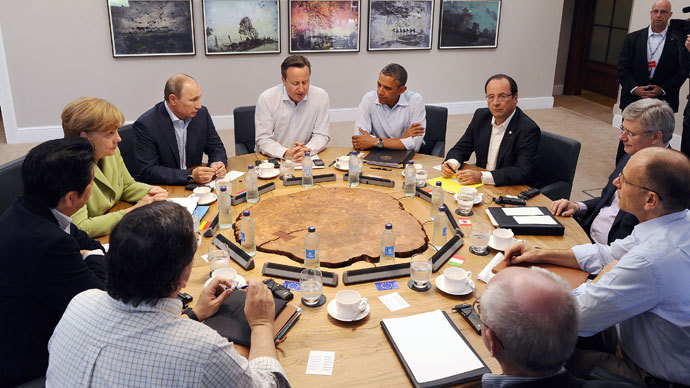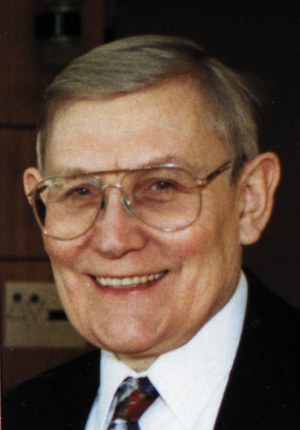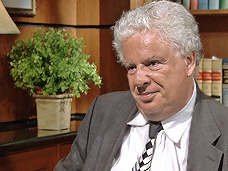
Published 25-06-2013, 08:40
 The ongoing conflict in Syria featured high
on the agenda of the meeting of G8 leaders in Lough Erne, Northern Ireland on
17-18 June – not least because of Washington’s recent decision to send arms to
the rebels opposed to the regime of Syrian President Assad. That decision
follows White House allegations that the Syrian government forces have deployed
chemical weapons, albeit on a small scale, which US President Obama has described
as Washington’s "red line”. In late May the EU likewise signalled a tougher
stance toward the Assad regime through its lifting of the Union’s arms embargo
against the rebels in the wake of heavy lobbying by France and the UK.
The ongoing conflict in Syria featured high
on the agenda of the meeting of G8 leaders in Lough Erne, Northern Ireland on
17-18 June – not least because of Washington’s recent decision to send arms to
the rebels opposed to the regime of Syrian President Assad. That decision
follows White House allegations that the Syrian government forces have deployed
chemical weapons, albeit on a small scale, which US President Obama has described
as Washington’s "red line”. In late May the EU likewise signalled a tougher
stance toward the Assad regime through its lifting of the Union’s arms embargo
against the rebels in the wake of heavy lobbying by France and the UK.
Russia, widely believed to be Assad’s main backer, has condemned these developments, pointing out that sending arms directly to the rebels – and hence further fuelling the conflict – could compromise the peace effort to which both Russia and the US signed up when in early May they called for an international conference in Geneva. For his part, Russian President Putin has argued that his country’s supplies of arms to the Assad regime do not contravene any international agreements and are, in any case, sent directly to the Syrian government, which Moscow considers to be legitimate.
It was evident that Putin’s meetings with Obama at the G8 summit in Northern Ireland and with UK Prime Minister Cameron earlier in London were tense: all three leaders signalled deep disagreements between the West and Russia over how to deal with the Syrian conflict, while at the same time expressing the desire to help bring that strife to an end. It seems that the main stumbling block is whether Assad should play any role in Syria’s transition government. The West sees Assad as a dictator with blood on his hands who should have no say in determining the country’s future once the conflict has ended. Moscow regards him – for all his faults – as Syria’s legitimate leader and, argues that, as such, he cannot be simply sidelined.
Much had been written before the summit about Russia’s alleged isolation within the G8, and Putin was clearly short of allies during the Lough Erne meeting. But in reality Russia is isolated within a group that itself appears increasingly out of touch with global developments. Established back in 1975 by the US, the UK, Germany, France, Italy and Japan and expanded one year later through the addition of Canada, the G8 is demonstrably an exclusive Western club to which Russia was added mainly for symbolic reasons in 1998. More recently, the world has witnessed significant changes, notably the rapid rise of China and the other BRICS countries. Excluding those states from a grouping that addresses global problems defies any logic.
Moreover, it could be argued that the West is in fact isolating itself from what may be – or at least may be on the way to becoming – a global majority view on how the international community should deal with conflicts such as that in Syria. China’s opposition to the West’s overthrowing regimes with which it (the West) is at odds (while continuing to support less democratic ones when this suits its purposes) is well known. The critical question here is how long the West will continue to ignore reality. Its ongoing opposition to a thorough reform of the IMF to reflect member countries’ global economic weight (for which Putin called ahead of the G8 summit) does not augur well.
That said, there have been some positive recent developments, including Russia’s current presidency of the G20, which in recent years has become an increasingly prominent club in the tackling of the global economic crisis. Plus Russia will take over the leadership of G8 in 2014. This will have the dual effect of removing any sense of that country’s isolation within the club of Western nations and throwing the spotlight on the newly emerging economic giants.
Questions:
- •How isolated is Russia today? Can it be argued that the West is out of touch with the rest of the world?
- •Why does Moscow risk attracting opprobrium over its backing for Assad?
 The topic for the Discussion Panel is provided by Vlad Sobell,
The topic for the Discussion Panel is provided by Vlad Sobell, Editor, Expert Discussion Panel
Professor, New York University, Prague
Editor, Consensus East-West Europe
Expert Panel Contributions
 Dmitry Mikheyev
Dmitry MikheyevFormer Senior Fellow at the Hudson Institute, teaches "Leadership in the 21st century” at various business-schools in Moscow
Seeking the peaceful resolution of conflicts is always preferable
Disagreements over the Syrian conflict between the West, on the one hand, and Russia and China, on the other, are indeed very profound. The US-led West sticks to the centuries-old tradition of solving conflicts through the application of its overwhelmingly superior force. Russia and China, who advocate negotiations in which all belligerents take part and working out a settlement through the political process, are suggesting very attractive alternative. In the wake of the Arab Spring, the international community should consider developing the Russo-Chinese approach to the Syrian conflict into a new, explicitly reconciliatory method of conflict-resolution.
The American way of conflict-resolution is explicitly confrontational and annihilationist.[1] First you determine which of the opposing sides is the "good guys” and which is the "bad guys.” Then you side with the "good guys” and exterminate the "bad guys” who foolishly oppose democracy, modernization, human rights etc. After the enemy’s unconditional surrender you dismantle its political institutions and launch the process of reconstruction – which, in effect, means the total revamping of socio-politico-economic system.
This method was introduced, developed and implemented by the Abraham Lincoln administration during the Civil War. Using a scorched-earth strategy, Generals Grant, Sherman and Sheridan forced the rebels into an unconditional surrender, after which the South was subjected to Reconstruction. This approach resulted in the greatest American tragedy. More than 1.1 million mostly white American males were killed and maimed; and several, mostly southern, states were totally devastated. Some 150 years after Robert E. Lee’s unconditional surrender and Lincoln’s famous promise "With malice toward none”, it is abundantly clear that the conflict has not been overcome and the trauma lives on. Thus, while most Americans rank Abraham Lincoln as the best president of all time and some worship him as the God-sent "Savior of the Union” and "Great Emancipator”, a substantial minority calls him a dictator, butcher and criminal. The Civil War still simmers and occasionally flares up.
The American Civil War was only a prototype of the total war. We in Europe perfected it by adding such innovations as strategic bombing, gas chambers, ethnic cleansing and GULAGs. Thus "the most civilized and enlightened people” on earth have taught the rest of the world how to settle disputes. Some of them, particularly in Eurasia, proved to be exceptionally diligent pupils. Altogether, the continent has seen the extermination of some 200 million "bad guys” – much of it in the name of peace, justice, democracy and progress. Fortunately, many Europeans have learned their lesson. The largely bloodless democratic revolutions in Eastern Europe and Russia at the end of the century have shown that an alternative to the annihilationist approach to conflicts does exist and can succeed.
At the heart of the annihilationist approach lies Manichean dichotomization and the Puritanical treatment of the "bad guys” as Satan’s minions. This precludes any dialogue and reconciliation. Satanic forces should be annihilated, for anything else would be a betrayal of God’s way. How do you correctly identify good and bad guys? Simple. Americans, as the "chosen people” are good, hence those who don’t join them in the "coalition of the willing” are evil” or at least suspect.
The European philosophy of total war is conceptually opposite to that of Sun Tzu and Confucius. Sun Tzu said: "Generally in war the best policy is to take a state intact; to capture the enemy's army is better than to destroy it.” A precondition for victory is "moral influence" – the treatment of all people with benevolence, justice, and righteousness.[2] Sun Tzu's approach to war is in line with Confucian humanism. Confucians believe in variety and multiplicity, they don’t divide people into good and evil because according to Confucian philosophy all people are on the continuum of moral development.[3] From this can be made the following very important inference: you can talk to, reason and deal with anyone – even a terrorist.
Ironically, the Confucian/ Sun Tzu approach to conflict resolution is truly democratic in spirit, unlike the annihilationist Western approach. Doesn’t democratic process presume a civilized discourse in which different views are not only voiced but taken into account and accommodated within an overarching goal of the common good?
I think the time has come for China, Russia and perhaps some European fledging dissidents (Germany?) to develop a new, explicitly reconciliatory method of conflict resolution. I propose that these powers form an "arbitrage court,” an informal and independent platform of conflict resolution.
At the first sight of a brewing civil conflict, such as that in Syria, the "arbitrage court” would organize a conciliatory conference. The influential regional powers and all neighbors of the country in conflict would be invited to participate as observers and arbiters. The "arbitrage court” would then invite representatives of all contesting factions to discuss their views of the root causes of the conflict, their grievances and their vision of a just solution and a comprehensive arrangement acceptable to all sides. Arbiters would be strictly impartial and would not impose any solutions. Their role would be to alleviate the mutual fears and suspicions of the opposing sides, to foster mutual respect, understanding, reciprocity and trust. They would facilitate a dialogue and frank discussions and help reconcile the divergent interests and aspirations of different ethnic or social groups. The ultimate goal of the forum would be to work out mutually acceptable solutions through power sharing and cooperation. The arbiters would exercise no formal power but their combined economic, political, military and diplomatic prowess as well as moral authority would be sufficient to stymie an escalation of the conflict into bloodshed.
I am sure that the realpolitikos will accuse me of idealism, naiveté or even silliness. But how smart have their annihilationist "peace-making” endeavors been? Lincoln, allegedly an exemplary leader, failed dismally at the very beginning of the conflict. Instead of calling a peace conference, he declared the mobilization of 75,000 militiamen to drive separatists back to the Union. The result was opposite of what he anticipated: four more states joined the "rebels.”
How realistic are the "realists” who at the start of every major war claim that "our boys will be home by Christmas”? Their "realism” rests on the assumption that "by nature” humans are hateful, intolerant and aggressive toward "others”. They are dead wrong. The overwhelming majority of ordinary people prefer to work, tend their gardens and play with their children rather than stick bayonets into the bellies of "bad guys”.
That said, I do recognize one great obstacle to the reconciliatory approach to conflict resolution – namely, religion. Reason is powerless against religion-grounded arguments and claims, and I, for one, don’t know how we can handle conflicts of this kind.
[1] Russel F. Weigley, The American Way of War: A History of United States Military Strategy and Policy (Indiana University Press, 1973)
[2] Sun Tzu, The Art of War, trans. Samuel B. Griffith (Oxford University Press, 1963)
[3] Daniel A. Bell, China's New Confucianism (Princeton University Press, 2010)
Nicolai N. Petro
Professor, Department of Political Science
University of Rhode Island
The West’s moral standards are by no means universal
The recent G8 summit revealed that, having decided on the proper moral stance the world should take on Syria, some of the participants were not keen on hearing opposing arguments. Canadian Prime Minister Stephen Harper’s remark about this being the "G7+1” was meant to suggest that Russia does not belong in such august company, but it could just as easily have been translated as the "G7 against the Rest.” And, like Samuel Huntington’s comparable formulation, it does not imply any common purpose among the Rest, beyond a disapproval of the West’s self-righteousness.
Yet there is, in fact, no unity to be observed even among the G7. As Patrick Armstrong notes, it is really "more like G4 ½ plus 3½ .” Moreover, Russian Foreign Minister Sergei Lavrov argues that while tactics may differ, the objective "to save Syria as a sovereign, multi-ethnic and multi-confessional state” is shared by all.
But there is one very significant catch. A few states insist on an additional goal – the removal of Syrian President Bashar al-Assad. Despite all evidence to the contrary, they are convinced that this will not only end the conflict but somehow transform the Syrian opposition into a viable governing council.
Russia, on the other hand, points to the many groups in Syria that continue to support Assad, either out of loyalty or out of fear of the rebels. It suggests that insisting on Assad’s removal merely encourages rebel intransigence and prolongs the fighting.
Given the complexity of the situation, it is curious to hear claims that the removal of Assad is the only truly moral approach. It is certainly not a morality that most international relations thinkers would recognize, for it appears to be devoid of any sense of moral reckoning and responsibility for the outcome.
This is not to say that intervention on behalf of universal moral standards is never justified. Russia has repeatedly stated that sovereignty is not an absolute right and does not, for example, allow nations to engage in such things as genocide.
But intervention must be held to a clearly defined international standard. It must, at the very least, reflect the consensus of the world community, not merely the judgments of a handful of nations. In other words, the judgments of a handful of Western or Arab governments cannot take the place of the explicit judgment rendered by the entire world community, expressed through its acknowledged instrument – the United Nations.
It is difficult for some in the West to understand and appreciate Russia’s stance for what it actually is – namely, one of moral principle – for most simply take for granted that Western moral standards are universal. Russia, however, assumes that universal moral standards are achieved only when a consensus among nations emerges. Where consensus cannot be achieved, there is no universal moral standard (at least not yet).
This type of moral discourse also demands that participants reflect long and hard before orchestrating regime changes. It is, paradoxically, a discourse that international relations theorists like Reinhold Niebuhr, George F. Kennan, and Sir Herbert Butterfield would have appreciated.
 Patrick Armstrong
Patrick ArmstrongPatrick Armstrong Analysis,
Ottawa, Canada
G8 leaders are out of sync with opinion in their own countries
Is Putin really as isolated on Syria as we are told? There is plenty of evidence that he is in general agreement with world opinion. He is in better agreement with Americans about intervention than Obama is: a number of polls show opposition to US involvement in the range of 60%. Opinion surveys point to similar results in the UK. As to the rest of the world, a recent Pew survey shows there is little support for intervention anywhere else either. Putin’s opposition to outside interference reflects world opinion much better than the interveners do. Which may be why there is such an intense campaign against Russia and Putin: he must be discredited.
Putin does not "support Assad” – that is an accusation to drown out what he is really saying. Putin opposes intervention in Syria (and Iraq… and Kosovo… and Libya…) for three reasons: principled, practical and personal. First, intervention violates a key international principle because, like it or not, Assad’s regime is the recognized government of the country. By what right does a fraction of NATO, unsupported by its population, decide to pick a side in a vicious civil war? Once upon a time, interventions were legitimized by the UN (1st Gulf War); then by NATO (Kosovo); now by only some of NATO (Libya). Second, there is nothing to suggest that the end result will benefit anyone. Russia is a cautious country that plays by primum non nocere – first, do no harm. Previous Western/NATO interventions have done little for stability and have often resulted in aiding and comforting their enemies (a definition of treason in most countries). Finally, Putin fears that Russia might be on the list of undesirable governments to be overthrown. He has seen the appetite for intervention grow with the feeding.
Therefore, Putin opposes intervention in Syria because it is questionably legal, sets a(nother) dangerous precedent, will almost certainly leave behind a more chaotic, miserable and dangerous situation (vide Kosovo or Libya) and because he fears the extension to Russia. It has nothing to do with any "alliance”, "support” for Assad, the so-called naval base or arms sales. There is no alliance; Putin does not "support” Assad; the "naval base” is a corner of a small port with few facilities; and most of the arms sales contracts have been placed on hold. But it is necessary to demonize Putin to drown this out. The fuss about the Russian air defense missiles that never appeared was a useful distraction from the (US-crewed) air defense missiles that did appear. The fuss about the so-called naval base distracts attention from new US bases. The ritual reiteration of Putin’s support for Assad smokescreens the surreptitious support for his enemies.
So: not only will Putin be proved correct in that some of NATO’s interference will not have a happy ending, not only is his condemnation of intervention in accord with majority world opinion so far as can be determined, but it is even in accord with opinion in the countries whose leaders are cheering on NATO’s next adventure in "humanitarian interventions”.
While Putin may be out of step with the G8 majority (somewhat smaller than it pretends to be – does anyone seriously think Tokyo has signed on? Who expects Berlin, which kept out of the last adventure, to participate in this one? Is Rome on board?), that pseudo-majority is itself out of step with public opinion in its own countries and, so far as can be determined, out of step with world opinion.
Calling him isolated is an attempt to shout down the reality that the interveners’ own electorates do not support intervention.
Edward Lozansky
President, American University in Moscow
Professor of World Politics, Moscow State University
Is it really One against Seven?
According to news reports from the G8 summit, when it came to the issue of Syria it was always the lonely Putin up against the other seven. Canadian Prime Minister Stephen Harper blasted the Russian President for supporting the "thugs of the Assad regime”. "I don't think we should fool ourselves,” Mr. Harper said. "This is the G7 plus one. Let's be blunt, that's what this is: the G7 plus one." Well, if Harper's intention was to humiliate the Russian leader, then it obviously backfired: the G8 final resolution was written on Putin's terms.
There is also a rather ironic twist to this whole business. It looks like Putin's position was in line with the opinions not only of the majority of the American public but also of the conservative wing of the Republican Party.
Numerous public opinion polls show that less than one third of Americans back Obama's policy of supporting the Syrian rebels even to the point of supplying them with arms. Republican conservatives are even blunter. According to Richard Viguerie, who is one of the Republicans' top ideologists and fundraisers, "direct US intervention in the Syrian civil war is a folly of potentially disastrous proportions.”
Pat Buchanan, who ran for the White House in the past and is now one of America's most prominent political commentators, had this to say: "Obama has put us on the escalator to a war already spilling over Syria's borders into Turkey, Lebanon, Iraq and Jordan, a war that is now sundering the entire Middle East along Sunni and Shia lines. He is making us de facto allies of the Al-Qaeda-like al-Nusra Front, of Hamas and jihadists from all across the region, and of the Muslim Brotherhood”.
Sarah Palin got a round of applause during her speech to the "Faith and Freedom Coalition” conference when she said that in Syria's civil war, where "both sides are slaughtering each other as they scream over an arbitrary red line 'Allahu akbar' ..., I say let Allah sort it out.”
Even the hawkish Financial Times echoed Palin: "Those who are urging the US to get more deeply involved in the Syrian conflict now are living in the past.”
Things have changed dramatically from the days when the US dominated the Middle East. The humiliating failures in Afghanistan and Iraq have cost $2 trillion and left more than 7,000 US troops dead, 40,000 wounded, hundreds of thousands of Iraqis and Afghans dead, and millions of refugees. There isn't much to show for this vast human and material sacrifice.
The neocons like Senators John McCain and Lindsey Graham, the Republican Party's warmongers, while admitting that they have no idea which of the various anti-Assad factions the US should back still are pushing the nation into yet another disaster come what may.
It is a no-brainer to figure out that once Obama made that foolish statement that the use of chemical weapons in Syria would constitute a "red line" and grounds for US military action, the anti-Assad groups would find a way to engineer some provocation and frame the regime.
Assad would have to be out of his mind to use chemical weapons after such a message from Washington, for he doubtless remembers the "weapons of mass destruction" fiction about Iraq in 2003.
The "red line" folly played directly into the hands of those who wanted to see American troops in action. Pat Buchanan has coined a brilliant term – "McCainiacs”. The sad part of it is that the war wagon has started rolling and once it starts, it takes years to stop – just look at the 12-year war in Afghanistan and the 10-year conflict in Iraq.
America is opting for a clearly less than intelligent policy, despite the undisputed fact that after two years of civil war, support for the regime of Syrian President Bashar al-Assad has sharply increased.
As reported by the Middle East Newsline, data compiled by West-sponsored activists and organizations show that a majority of Syrians, alarmed by the al-Qaeda takeover of the Sunni revolt, preferred to return to supporting Assad: "The people are sick of the war and hate the jihadists more than Assad."
A report commissioned by NATO says that the Syrians have undergone a change of heart over the last six months. The change was seen most clearly in the majority Sunni community, which had long been thought to have supported the revolt. "The Sunnis have no love for Assad, but the great majority of the community is withdrawing from the revolt. What is left is the foreign fighters who are sponsored by Qatar and Saudi Arabia. They are seen by the Sunnis as far worse than Assad.”
These are very unambiguous pointers, and they show clearly who was on the right side of history at the G8 – not the majority of seven but the "lonely” one.
 Martin Sieff
Martin SieffChief Global Analyst, The Globalist
Unlike the West, Russia knows what it is doing over Syria
Russia is not at all isolated in the world: It is well on the way to becoming the leader of a disparate group of states comprising at least three times the combined population of the United States and the European Union.
In a nutshell: Russia is indeed isolated – an odd man out – in the G8. But it represents a powerful, growing force in the G-20.
Russia and China are strategic allies and have been ever since the Shanghai Cooperation Organization (SCO) was set up in June 2001. Russia also retains its historical strategic defense alliance with India, first signed between the Soviet Union and India in August 1971. China and India are the two most populous nations on the planet, indeed in all of history, with a combined population of more than 2.5 billion. The combined population of the United States, Canada, the European Union and Japan is around 1 billion, around 40 percent of the combined populations of India and China. Any nation that can count China and India – which is also the most populous democracy in the world, and in all of history – as its allies is certainly not isolated.
Russia is also building strong diplomatic and strategic ties and growing economic ones with its other BRICS partners – Brazil and South Africa – the dominant economic nations in South America and Africa, respectively. However, it still lags far behind the United States, the European Union and China in terms of matching its genuine geopolitical and diplomatic clout with global economic power. Also, neither China individually nor the BRICS nations as a group has so far managed to create any serious economic organization to coordinate, magnify and expand their economic power to a level comparable to the EU or the North American Free Trade Agreement (NAFTA).
Russia’s paradox is the obverse of the West’s. The West, represented by the United States and the EU, remains the main organizing force for global investment, although China is coming up fast to challenge it. So long as the global economy remains stable or expanding, the West will continue to ride high around the developing world too.
However, in contrast to the consistent position it took during the Cold War, the West is now the main destabilizing force for revolutionary change throughout Asia, Africa, the Middle East and Latin America. This automatically alienates governments throughout those vast areas and makes them turn to Russia and China as reassuring counterweights.
By its ideological obsession with actively spreading instant democracy everywhere, the West is thereby squandering the four-and-a-half decades of global leadership it won through long and patient effort during the Cold War.
Russia is facing inevitable opprobrium from its fellow G8 members, though not from China, India or its other BRICS partners over its support for President Bashar al-Assad in Syria. Russia is doing this for the same old-fashioned power politics reasons that led the United States to defend Saudi Arabia and liberate Kuwait from Saddam Hussein in 1991 and to go charging disastrously into South Vietnam in 1964. In each case, the superpower acted to defend endangered allies in regions of the world where it had already lost major ground and feared to lose more.
In supporting the opposition forces in Syria, Western countries are blind to those forces’ domination by the Ikhwan, or Muslim Brotherhood, which already controls Egypt and Gaza. So far, there is no sign this blunder will be rectified. On the contrary, it is growing worse. Russia, at least, knows what it is doing in Syria and why. The same cannot be said for Western policymakers.
 Andrej Kreutz
Andrej KreutzAdjunct Professor, University of Calgary
Affiliated Expert, European Geopolitical Forum
In opposing the other members of the G8 Russia demonstrates concern about its own security
For a number of reasons, which are not necessarily related to Syria and even to the Middle East as a region, Russia is now more isolated from European nations than it was a decade ago. At that time, most of those nations opposed American intervention in Iraq, while Paris and Berlin were even more outspoken and critical than Moscow itself.
Similarly, the Sunni leaders of the Arab states are at present divided and they are too dependent on the West to adopt any significant independent positions. However, public opinion in the Arab world is quite diverse and frequently does not approve of Arab leaders’ policies. Russia has the support of China and, at least to a point, of the other BRICS nations. The positions of the major Christian churches, including the Vatican, are also much closer to the Russian stance than to that of the West.
Further, according to a recent poll, the majority of Americans are against Western military intervention in Syria, while other reports suggest that most people in other countries do not want a new war in the Middle East. Thus, with regard to possible major military intervention in Syria, Moscow’s stance appears more in tune with such views than with the aspirations of Western leaders.
Moscow’s present dispute with the United States and its allies, including the European Union and the Arab League, is not primarily about Middle Eastern geopolitics, Cold War alliances, arms sales or even particular issues such as the Tartus naval re-supply facility, which gives Russia some ability to operate in the Mediterranean and perhaps in the Indian Ocean. All these factors might be important but they are secondary.[1] From a Russian policy perspective, the present Syrian issue resembles that of Libya, Iraq, or Yugoslavia in the past: it is "primarily about the world order.” [2] Being well aware of its relative weakness in relation to the US superpower, post-Soviet Moscow puts emphasis on interstate relations being based upon "respect for sovereignty and territorial integrity, and the primary responsibility of the UN Security Council in supporting international peace and security”. [3]
Consequently, Moscow does not want to accept foreign military intervention without a UN Security Council mandate and rejects the concept of regime change under external pressure – namely, the principles of the "responsibility to protect” (R2P), established by the UN in 2005. Moscow does not want to allow the US to use force at will and without any external constraints, as this "might lead to foreign intervention close to Russian borders, or even within those borders”. [4] In fact all regimes except the democracies that are certified by Washington or its allies could theoretically be considered as lacking legitimacy, and the possible implications of that for Moscow are quite obvious.
Another important, albeit secondary, factor for Russian policy toward the Syrian conflict is Moscow’s concerns about the involvement of extremist organizations such as Al Nusra Front and various other radical groups that are now playing an important role among the Syrian rebels. According to reliable sources they include a number of volunteers or mercenaries from Russia, especially from the Northern Caucasus region. [5] Islamic terrorism, and the separatist aspirations often connected with it, poses a threat to Russian citizens and a challenge for the Russian state. The success of radical Islamists in Syria would thus represent a new problem for Moscow.
[1] Dmitri Trenin, "For Russia, Syria is not about Syria”, The Daily Star, Lebanon, July 3, 2012.
[2] Ibid.
[3] President Putin’s decree, as quoted in Jeffrey Mankoff, "Why Moscow fears Arab unrest”, Current History, October 2012, p. 260
[4] Trenin, op cit.
[5] At least 600 Russians and Europeans are fighting alongside the Syrian opposition,” www.russiatoday.com, June 21, 2013.
 Dale Herspring
Dale HerspringUniversity Distinguished Professor of Political Science
Kansas State University
Putin’s payback to the ‘weak’ Obama
Russia is isolated on the Syrian case, but frankly, I don't think Putin cares. He has drawn a line in the sand and is willing to stand by it, regardless of what the other members of the group think.
In particular, this is payback for Libya – where Russia was excluded from the post-conflict settlement. I also see it as a slap in the face for Obama. The latter has come to be perceived by the Russians (and Syrians, Iranians, Israelis and others) as unwilling to get tough when it is time to do so. Publicly humiliating Obama, which is the way it looked to some people, cost Putin nothing. After all, the next day Obama announced that he was cutting American nuclear weapons by a third in response to the Russians doing what?
Why not just sit back, ignore Obama's many threats and take what one can. Obama is a poor diplomat; in fact, one gets the impression that he has little understanding of national interests or how to play hard ball in the world of diplomacy.



_jpg/250px-ElbeDay1945_(NARA_ww2-121).jpg)





